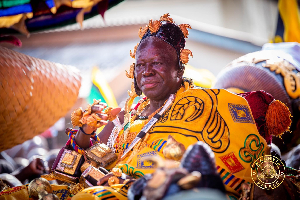POTROG’s assertion of 30 per cent women representation in his cabinet and their role in politics has led to uncomplimentary remarks; he is in the midst of a firestorm.
Representation is a serious global problem, and societies that understand the lost cultural and social capital in underrepresentation will attempt to methodically correct their mistakes and do the right thing.
One way of curing underrepresentation is to let data analysis direct us towards certain targets. In that regard, the Ghana Population and Housing Census is a useful guide.
Speaking of women’s representation – fair representation generally – the data will tell us that literacy rate for all Ghanaian languages including English is only 34 per cent, which really means that POTROG should fill up his cabinet and all other appointments with a 66 per cent quota of the illiterate population at least half of whom are women!
This really gets ridiculous, doesn’t it?
One way POTROG can satisfy the legal requirement of appointing at least half of his ministers from Parliament and meet the gender proportion of MPs at the same time is to reduce the number of ministers.
In at least two articles, we have advocated a maximum of 36 ministers.
Currently, there are 36 women MPs out of 275 or 13 per cent.
So if POTROG has only 36 ministers as originally proposed; at least 18 should be women. And he has a large enough cohort to choose at least 9 women from Parliament. Simple isn’t it?
But let us not forget that the president has other constitutional injunctions on him as well – regional balance in appointments, deputy ministers to be appointed in consultation with ministers, advice of Council of State, and above all the Directive Principles of State Policy (DPSP).
As a constitutional requirement, (Chapter Six of Constitution), the DPSP demands that the president and all public office holders avoid discrimination on grounds of gender, ethnicity, language, you name it, and ensure a united, just and free society.
Let us throw in a few more indicators of ours. What about Ghanaians of Lebanese descent? Just as the Fulani born in Ghana, the Ghanaians of Lebanese descent have been here for over 100 years; they are an integral part of our nation.
How about appointing ministers from the 37 or so ethnic groups whose languages are not written in school, for equity? After all, this is the International Year of Indigenous Languages.
The argument can get weird to the extent that almost any algorithm cannot help the president ensure representation to reflect the true makeup of the nation.
This is “identity politics” turbocharged and run riot.
“If carried to its logical conclusion, should the cabinet and political appointees not consist of minimum wage earners with little formal education, who are female,” my mentor observes.
It should be obvious that as important as representative government is, it should be understood in a nuanced manner.
So there must be a way and there is.
It is that religion in which all men and women agree – the moral law and imperative anchored in a meritocracy; merit and ability, which is consistent with the DPSP and consonant with a rational balance and progress.
Ghana’s status based on human development indicators requires drastic improvement.
Is it not time to consider meritocracy so that the country can get sound leadership and guidance from competent men and women with strict morals who will work to ensure equal opportunities for all?
Identity politics is bogus; it will not help us; it only leads us into an intellectual and spiritual cul de sac. And once again, name calling will not help us either.
Feedback; ato@writersghana.com; www.writersghana.com; LinkedIn, Isaac Ato Mensah; Instagram, @atomenswriters; Twitter, @Atomens; Facebook, Isaac Ato Mensah; Telegram, Isaac Ato Mensah; Quora, Isaac Ato Mensah. WhatsApp (233) 020 022 0353.
Writers and Shakespeares Ghana Limited exist to be a moral and intellectual guide to the best practice of PR and integrated communications around the world, beginning with Ghana.
Opinions of Tuesday, 11 June 2019
Columnist: Isaac Ato Mensah



















